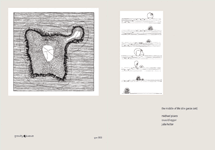|
|
 |
Dusted Reviews
Artist: Michael Pisaro Album: The Middle of Life / The Punishment of the Tribe By Its Elders Label: Gravity Wave Review date: Jan. 24, 2013 |

|
|
|
 |
If you have listened to American composer and multi-instrumentalist Michael Pisaro before, you have already heard the elements he uses on The Middle of Life. The music consists of interwoven field recordings, sine waves, and played instruments (mostly his piano and electronics). But he has drawn another component, poetry, into the foreground. Pisaro has previously acknowledged the influence of verse upon on his work, most notably on “July Mountain,” an effort to translate the Wallace Stevens poem of the same name into sound. But here he has threaded the spoken words of the Tyrolian author Oswald Egger into the music in a way that evades the specificity of speech without losing the potency of its meaning
Egger has turned up on record before. Venusmond, his collaboration with Burkhard Stangl, straddled the worlds of electro-acoustic improvisation and opera. Together, Pisaro and Egger have come up with something much harder to categorize. On this 47-minute composition, the words -- taken from Egger’s 742-page poem Die ganze Zeit (The Middle of Life) -- inhabit fields of parsimoniously interwoven instrumental and environmental sound. It isn’t exactly voice and music, but neither is it simply recitation plus sound design. If that were the case, then the sound would either support or frame the words; here, the two feel like parts of a larger whole that contains them both. Pisaro pans Egger’s voice and adds or withdraws sounds so that it seems like the disembodied poet is talking to himself out there in the world. Only Germanophones will know exactly what he is saying (at least until Pisaro gets a translation up on his blog). But seven other vocalists, including Julia Holter, Graham Lambkin and Taku Sugimoto, recite one key sentence in their own and other languages: “In the middle of life I found myself in the forest (with no path).”
None of the voices play up the existential terror implied by those words, and neither do the sounds around them. Rushing water threaded with bass tones threatens to overwhelm Egger, but his voice holds its own. Elsewhere, his calm tone complements the tranquility of birdsong lanced with sine tones. A piano melody written by Holter, who is a former student and recurrent collaborator of Pisaro’s, seems to trek around the speech like some arboreal creature inspecting a human picnic from a safe distance and altitude. Heard passively, this album is quite beautiful. But the timing, placement and relationship of the sound elements creates a synergy that deepens their meanings, so that the piece is more like a time-lapse representation of a symbol-laden canvas than a linear expression of a text. It’s one thing to hear the words quoted above in your own language spoken fluently over the sounds of field and forest, but another entirely for them to be expressed without familiarity, distant from the musical elements. Every time I hear Sugimoto struggle to say them in English, I think of refugees around the world who find themselves alone and bereft; but that’s just me, interpreting that one moment. How you read them is up to you. Likewise, Holter’s melody is a fetching thing on its own, but when you put your former student’s music at the end of your own piece, are you telling her to stand in line or passing her the torch? It’s the listener’s call. There are no right answers, but plenty of ways you can complete The Middle of Life in your own mind.
The Punishment of the Tribe By Its Elders is a second piece of music that grew out of the making of The Middle of Life. As Pisaro worked on the material, some of it acquired a dark quality that didn’t fit, so he used it to construct a sequence of musical events that never quite explain themselves but strongly imply a narrative. The sound palette is quite different from The Middle of Life; guitar, bass, bells, and recordings of rain and snatched-away fragments of classical and rock music bring an overt grittiness quite at odds with the other album’s stately piano and more temperate environmental sounds. At first, enigmatic or overtly uneasy musical passages accumulate a quiet but palpable tension. Then a couple brief passages of recognizable speech offer some clues to understanding how the titular tribe offended their elders. First, a man and boy discuss in accent-free American voices a drive across Texas; later, a broadcast French speaker discusses (as best I can tell — my French is pretty limited) the possibility of innocence and guilt within the modern state. Again, there’s room for interpretation, but whatever compassion or concern for humanity Pisaro manifested in The Middle of Life’s sound/speech juxtapositions seems to evaporate after he introduces the forces of institutional power in Punishment. After some brooding, Loren Connors-like guitar and funereal electronics, the axe finally falls with an event so out of character for Pisaro, you might never think of him as the quiet guy again. And even if you’ve grown accustomed to the sonic beauty and intellectual rigor of his music, you might be pleasantly surprised by the emotional power of these two records.
By Bill Meyer
|







